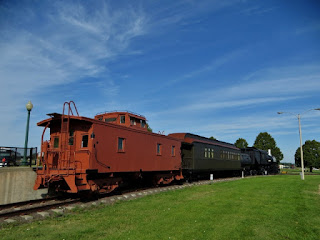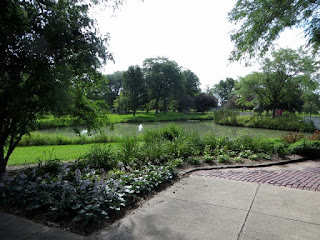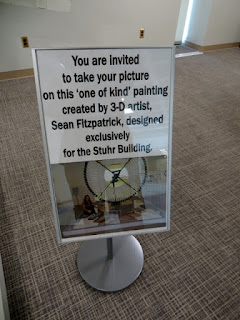Before the eclipse trip, Bob and I bought and read "American Eclipse: A Nation's Epic Race to Catch the Shadow of the Moon and Win the Glory of the World," by David Baron. The book is a true story of the total solar eclipse of 1878 in the United States, people's beliefs, superstitions, scientific inventions, early women's rights proponents, and the race to prove that America's growing nation could provide value to the scientific community worldwide.
In the book, Baron emphasizes the careers of Albert Einstein, an eccentric American inventor; James Craig Watson, a conceited cosmologist who competed with other astronomers to find the next planet or star; and Maria Mitchell, a Vassar astronomy professor, and president of the American Association for the Advancement of Women, who was an early fighter for equality in the treatment of and pay for women. It was a good read.
As for the 2017 eclipse, the news stories intended to scare us into believing traffic back-ups would be miles long did not apply to our route to the Volksmarch start point in Hall County Park, Grand Island, Nebraska. From our hotel to the park, there was very little traffic...maybe four cars from Locust Drive along Schimmer Drive into the park. However, once we started walking, we did see a long line of cars on the main highway waiting to get into the Stuhr Museum grounds. We heard from others in the park that the line of cars going that route was backed up along the shoulder for four miles--all the way to I-80.
As soon as we parked in the county park, we registered for the walk, received stamps in our Volksmarch books, were handed instructions, and we set out on the walk. The walk took us on one lap around the county park and then entered a trail across the Wood River Flood Control Project drainage area.
Quoted from the historical marker:
"In 1967, 10 inches of rain fell over nine days...The flooding damaged buildings and homes affecting nearly 1/3 of the city. This flood set the city's ground work for the Wood River Flood Control Project.
"May 12, 2005: On this day, water from the Wood River rose when more than seven inches of rain fell near Grand Island. Floodwater was diverted into the Wood River Flood Control Project that had been completed the previous year. The diversion prevented more than $23 million in damages just months after its completion."
Luckily, there was no water in the drainage area today. We crossed through it on a bike path and then climbed up onto a dike. As we walked along the dike, we could see the historic church in the Stuhr Museum area.
 |
| Immanuel Evangelical Lutheran Church - as seen from the dike outside Stuhr Museum grounds |
 |
| Immanuel Evangelical Lutheran |
 |
| One of many stained glass windows |
The NASA booth was giving away solar eclipse glasses for free along with temporary NASA tattoos. Susan and I each put on the temporary tattoos. Most of the eclipse-viewing entertainment, food trucks, and information were in this area.
In addition to NASA, WeatherNation also had telescopes set up in another location on the museum grounds. (This total solar eclipse is a really big event. People who have seen total solar eclipses before, travel all over the world to be able to see them again. A partial eclipse just isn't the same.)
The Volksmarch instructions gave us a general route (we chose the 10k walk) to follow clockwise around the museum complex. There was a map included so we could find our way. It is a very large place, encompassing Taylor Ranch, Pawnee Earth Lodge, the large indoor Stuhr Museum Building (admission included), a train display, Gus Fonner Memorial Rotunda, Grand Island Baptist College Memorial Pillar Garden, a re-created Railroad Town, Log Cabin Settlement, and Antique Farm Machinery & Auto Exhibit.
As we made our way around, we came upon friends we had seen the evening before on the Central City walk. One of them was now wearing a cast on her arm. She fell while walking over railroad tracks in town. We felt terrible for her and we wished her a quick recovery.
We passed the Old California Overland Trail marker below (and the Mormon Trail marker) and it got me thinking about the adventurous spirit of the pioneers. By the time they got to this part of the trail they were probably questioning their decision to move west. Many people were dumping belongings because they were too heavy and slowed down their oxen. Adults and children would spend a lot of time walking alongside their wagons because the ride was too bumpy to stay seated in them. They also had to worry about diseases and bands of raiding Indian tribes in certain areas. But the reward of homesteading on their own land in a new, uncrowded place was worth the risk of the journey. This line of thought made me appreciate being able to walk for pleasure in the lands they helped settle.
Astronomers from all over the country brought their telescopes for today's event. A field to park in was set up exclusively for those with big telescopes.
The train exhibit was next on our walk, followed by the Stuhr Museum Building. When we entered the museum building, we enjoyed the cool, air-conditioned comfort of the building. We took our time looking at the artwork and exhibits about Nebraska history.
Henry Fonda is a native son of Grand Island, Nebraska. His boyhood home is on the grounds of Railroad Town. The museum included an exhibit about him.
Below is a piece of art that asks you to have your picture taken on it. So I did.
The Stuhr Museum of the Prairie Pioneer had so many exhibits, most dealing with the history of Nebraska. "Painting the Legacy of Nebraska" exhibit by Todd Williams shows Nebraska in art. This is an official traveling exhibit of the Nebraska Sesquicentennial Celebration. (No photos were allowed of the paintings.)
Here are photos of other exhibits in the museum:
The photo below is a painting on the wall. There is a bench in front of the painting and when you sit on the bench to take a photo, it looks like you're peering out through the window of a farmhouse.
Photo below: Young boys help in the sugar beet harvest. Mules pulled the harvesters along the ground. The harvesters pulled the beets up.
I was fascinated by the display called "Torture or Beauty?" There were items that were used in beauty parlors that were precursors to modern curlers and vibrators (?).
After we looked around Railroad Town, we decided to have a hot dog lunch at the Silver Dollar Cafe. The cafe had a tent with table and chairs under it. We ate there to stay in the shade. Then we figured we had a good view of the sun and the area wasn't very crowded, so we stayed there through the whole eclipse.
For a while, it looked like we might not get to see the eclipse because clouds were moving in. Uh oh. But we're ready anyway!
Earlier in the blog, I mentioned NASA was sending up special balloons loaded with technology to live stream the eclipse from 70,000-90,000 feet. Below is one of the three balloons they sent up. It flew right over us.
As soon as the sun was at 100% totality, you could hear everyone in the museum complex cheering and clapping. During the total eclipse, we had to take off our eclipse glasses. We had a little over two minutes of totality. How can I describe how cool it was to look at the sun and see only the corona shooting out from around the moon? The temperature dropped about ten degrees. There were no shadows on the ground, and you could see planets and some of the brighter stars. The sky was almost purple. It was amazing!
Just before it was time for the sun to peep out again, we put our eclipse glasses back on. I was able to see a red diamond pattern around the top right edge of the moon. That apparently is called "Baily's beads" or the "diamond ring." I had read about it, but they said you can't always see it. I was thrilled to see it!
As soon as the sun started coming back out, we had full shadows, even though the sky didn't look fully bright yet. It was an eerie feeling. It took about 10-15 minutes before full brightness returned and the sky looked more normal.
The cafe had closed for the eclipse so the employees could watch it too. After the eclipse, they reopened and we went back for single-scoop ice cream cones because it was HOT out.
We finished our walk by going to see Henry Fonda's childhood home (below). We toured the house and asked the docent why there were sheets as room dividers instead of walls. She said there were two reasons: (1) in the summertime they would open the windows on opposite sides of the house to create a cross-breeze to cool it down inside, and (2) in the winter, the houses were heated with a stove. If they built solid walls, the heat could not get to the rooms with solid walls and doors. With the sheet for a wall, the heat could permeate the room.
We headed back into Hall County Park to retrieve the car. It was a wonderful day.
The rest of the day was spent relaxing. Susan and Darren did a load of laundry and I put a couple of items in their load. Later, I decided to do a load of laundry too. That way I won't have to do laundry as soon as I get home.
We plan to leave early in the morning and do a 5k Volksmarch in the Swedish town of Lindsborg, Kansas on our way home. Travel Bug out.
 |
| NASA's staging area for sending up high-tech balloons |
 |
| NASA employees answering questions |
 |
| Me sporting a NASA temporary tattoo |
 |
| Here's NASA's StreamEclipse.Live van Payload Recovery Vehicle |
The Volksmarch instructions gave us a general route (we chose the 10k walk) to follow clockwise around the museum complex. There was a map included so we could find our way. It is a very large place, encompassing Taylor Ranch, Pawnee Earth Lodge, the large indoor Stuhr Museum Building (admission included), a train display, Gus Fonner Memorial Rotunda, Grand Island Baptist College Memorial Pillar Garden, a re-created Railroad Town, Log Cabin Settlement, and Antique Farm Machinery & Auto Exhibit.
As we made our way around, we came upon friends we had seen the evening before on the Central City walk. One of them was now wearing a cast on her arm. She fell while walking over railroad tracks in town. We felt terrible for her and we wished her a quick recovery.
 |
| OUCH! |
 |
| Taylor Ranch |
 |
| Pawnee Earth Lodge |
 |
| Circle of Life |
Astronomers from all over the country brought their telescopes for today's event. A field to park in was set up exclusively for those with big telescopes.
 |
| The field for big telescopes |
 |
| Setting up the telescopes |
 |
| Susan and Darren in the train's engine |
 |
| Susan M. on the caboose |
 |
| Me on the caboose |
 |
| Train display |
 |
| Stuhr Museum of the Prairie Pioneer |
 |
| "Who is Henry Fonda?" |
Below is a piece of art that asks you to have your picture taken on it. So I did.
The Stuhr Museum of the Prairie Pioneer had so many exhibits, most dealing with the history of Nebraska. "Painting the Legacy of Nebraska" exhibit by Todd Williams shows Nebraska in art. This is an official traveling exhibit of the Nebraska Sesquicentennial Celebration. (No photos were allowed of the paintings.)
Here are photos of other exhibits in the museum:
The photo below is a painting on the wall. There is a bench in front of the painting and when you sit on the bench to take a photo, it looks like you're peering out through the window of a farmhouse.
 |
| Transit |
 |
| Solar compass |
 |
| Young boys harvesting beets |
 |
| Display of home furnishings in the 1920s and 1030s |
 |
| Permanent wave Duart (read about it below) |
 |
| Hair and scalp treatment vaporizer |
 |
| Shampoo shield |
 |
| An old carriage |
During our time in the museum, I was messaging Dave Navarro (a friend from Traveler's World RV Park) because he was at the same eclipse event. We were trying to figure out if we could meet up and say "Hi." It didn't quite work out because I was in the middle of our 10k walk and as I told him, "I was a moving target."
From the museum, we spent the rest of our time walking around and going through the open air exhibits, eating lunch, and then watching the eclipse.
 |
| Original gateway to Grand Island Baptist College |
 |
| Pretty pond and garden |
 |
| Log Cabin Settlement area |
 |
| Remember these? |
For a while, it looked like we might not get to see the eclipse because clouds were moving in. Uh oh. But we're ready anyway!
 |
| Camera, sunglasses, eclipse glasses (photo was taken with my Samsung smart phone) |
 |
| Here we are in our eclipse glasses |
Earlier in the blog, I mentioned NASA was sending up special balloons loaded with technology to live stream the eclipse from 70,000-90,000 feet. Below is one of the three balloons they sent up. It flew right over us.
 |
| NASA balloon |
 |
| Peeking out at the clouds from the tent |
 |
| Second NASA balloon--you can see all the technology stuff hanging underneath it |
 |
| Darren viewing the eclipse |
 |
| Susan and Darren watching at about 90% totality |
 |
| Me watching the eclipse from Railroad Town |
 |
| Very uncrowded where we were |
 |
| More watchers |
Just before it was time for the sun to peep out again, we put our eclipse glasses back on. I was able to see a red diamond pattern around the top right edge of the moon. That apparently is called "Baily's beads" or the "diamond ring." I had read about it, but they said you can't always see it. I was thrilled to see it!
As soon as the sun started coming back out, we had full shadows, even though the sky didn't look fully bright yet. It was an eerie feeling. It took about 10-15 minutes before full brightness returned and the sky looked more normal.
 |
| Susan exclaiming about how quickly it got bright |
We finished our walk by going to see Henry Fonda's childhood home (below). We toured the house and asked the docent why there were sheets as room dividers instead of walls. She said there were two reasons: (1) in the summertime they would open the windows on opposite sides of the house to create a cross-breeze to cool it down inside, and (2) in the winter, the houses were heated with a stove. If they built solid walls, the heat could not get to the rooms with solid walls and doors. With the sheet for a wall, the heat could permeate the room.
 |
| Henry Fonda's childhood home |
 |
| Walking back we had beautiful views |
 |
| This was the field where most of the people watched |
 |
| Crowds leaving (this was about an hour after totality) |
 |
| Lots of people wanted Sno Cones!! |
 |
| A long distance view of the church after we exited the Stuhr Museum grounds |
 |
| The bike path across the Wood River Flood Control Project |
The rest of the day was spent relaxing. Susan and Darren did a load of laundry and I put a couple of items in their load. Later, I decided to do a load of laundry too. That way I won't have to do laundry as soon as I get home.
We plan to leave early in the morning and do a 5k Volksmarch in the Swedish town of Lindsborg, Kansas on our way home. Travel Bug out.















